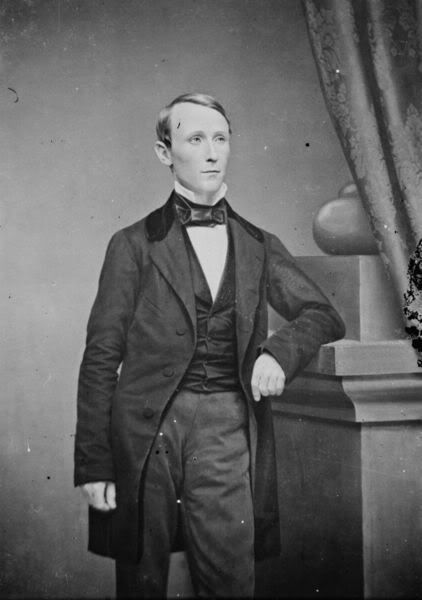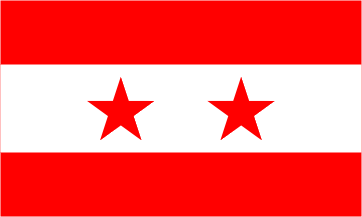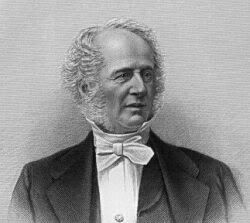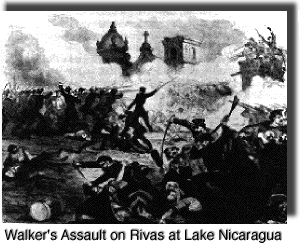The Last American Warlord
war·lord (wôr'lôrd'): A military commander exercising civil power in a region, whether in nominal allegiance to the national government or in defiance of it.
William Walker was executed by firing squad on September 12, 1860, in Honduras. In central america there were celebrations. In Washington D.C. and London there was a collective sigh of relief. If anyone mourned his passing outside of the American South, they did in private.
William Walker was described in many ways, most of them true - "visionary adventurer", "rugged individualist", "con-man", "grey-eyed man of destiny", "racist", "pirate". But there was only one description that encompassed all of these things: warlord.

One of my favorite stories in my book collection (and one of my favorite movies of all time) is Rudyard Kipling's, "The man who would be king." It's the story of two british soldiers who desert the army and go into Afghanistan to try to create an empire by force of arms. I suspect that William Walker was the inspiration for Kipling's story.
The Overachiever
William Walker was born May, 8, 1824 in Nashville, Tennessee and graduated summa cum laude from the University of Nashville at the age of just fourteen. He studied medicine in europe during the revolutions of 1848, and by the age of 19 had a medical degree from the University of Pennsylvania. After a brief career as a doctor, he traveled to New Orleans to study law.
After a brief career as a lawyer, he became co-owner and editor of the New Orleans Crescent newspaper. The newspaper employed a relatively unknown poet at the time called Walt Whitman. When the paper was sold he moved to San Francisco in 1849 to work as a journalist for the San Francisco Daily Herarld. While living there he fought three duels, in which he was wounded twice. He left San Francisco and moved to the gold-rush town of Marysville where he again set up a law practice.
By the age of 28 he had already managed a career and life that would be considered extremely rich by modern standards (or by any standards). But Walker was not normal. His dreams were much larger than anyone could have imagined.
Filibustering
The dictionary definition of "filibuster" has changed over time. Today it involves "obstruction tactics" designed to delay legislation. But in the 1850's it had a very different meaning.
It meant "an irregular military adventurer, especially one who engages in an unauthorized military expedition into a foreign country to foment or support a revolution." The term was originally used for pirate raids on the Spanish Main, but was revived by those supporting Manifest Destiny. The American government did little to stop these people, partially because they were regarded as heroes by the general public and partially because the country was on the verge of Civil War and had enough problems at home.
Walker, a son of Tennessee, was always sympathetic to the cause of slavery. Like others who believed in Manifest Destiny, he thought that Mexico was destined to be conquered by America. At the time France, a non-slavery country, was trying to bring Mexico under its influence.
In the summer of 1853, Walker and a friend named Watkins traveled to Sonora seeking a grant from Mexico, where he could establish a military frontier colony to be used against native americans. Mexico, only a few years removed from being conquered by American military aggression, refused. Walker was undeterred. He returned to San Francisco and opened a recruiting office for his private enterprise.
In order to pay for this military adventure, Walker sold script which would be redeemable in Sonora after he conquered it. Walker announced his intentions of forming the republics of Lower California and Sonora, with the intention of applying for admission into the Union afterwards (very much the same method used by Texas).
The American government was aware of his plan and made a half-hearted attempt at stopping him. But on October 16, 1853, Walker and 48 followers left on the Caroline headed for La Paz, Mexico.
The Republic of Lower California (Nov. 3, 1853-Jan. 21, 1854)
Three weeks later he landed at La Paz and captured it. The city was taken totally by surprise. Being sparsely populated at the time, there was little resistance. Walker declared himself President of the new Republic of Lower California. When word got out of his success, 200 followers joined him from California.
Walker drew up a pro-slavery constitution based on Louisiana's. Slavery had been banned in Mexico in 1821, a move that led to the revolt by Sam Houston and the Texans.
"The Republic of Lower California is declared free, sovereign, and independent quitting since now on of its alliance with Mexico".
- William Walker, November 3rd, 1853
Walker then moved his forces to Cabo San Lucas on November 8th when the Mexican government began to mobilize against him. He then retreated to Ensenada on November 29th. Walker sent Frederick Emory to San Diego to get supplies and troops for the adventure. On December 4th a small Mexican army led by Lieutenant Castillo Negrete and Antonio Melendres finally caught up with Walker's army and battle ensued. After several days of conflict and casualties, the outnumbered Mexican force retreated.
Instead of consolidating his
gains, Walker grew even more ambitious.

Republic of Sonora (Jan. 21, 1854 - May 7/8, 1854)
"The term filibuster no longer means a pirate ... It means the compassing of the weak by the strong... The term filibuster is now identical with the pioneer of progress... If these regions ... do not soon become a portion of the United States ... some other nation, stronger than Mexico, will grasp them."
- Judge Lott, Pioneer newspaper, 1853
"America secures the spoils won to her hand, however dishonestly they may have come. That is only her destiny ... America must round out her territory by the sea."
Soule, "Annals of San Francisco"
On January 21, 1854, Walker published a decree in the San Diego Herald which changed the name of his empire to the Republic of Sonora. And with that he invaded the state of Sonora.
Walker's forces were running low on provisions and suffering desertions. Four deserters were arrested. Walker had two of them shot, and the other two publicly flogged. Also, the people of Baja California were tiring of his rule and fought his troops when they tried to take their food in exchange for Walker's script. Walker's diminishing forces began advancing towards Sonora on March 20, 1854, but were assaulted by Apache indians and suffered heavy losses. He then retreated back towards San Vicente but then were attacked by Melendres and his reinforced army. Walker was defeated yet again.
Walker had no choice but to flee to the American border where General Henry S. Burton was waiting for him. Walker and his troops were taken to San Francisco to stand trial for violation of the country's neutrality laws.
It took the jury only eight minutes to acquit him. Walker returned to his legal practice.
Walker's expedition was not without permanent effects. The Gadsden Purchase was a direct consequence of his military adventure.
Robber Barons and Imperialism
In 1849 the United States and Nicaragua signed an treaty that gave the United States exclusive rights to a transit route across Nicaragua. In return, the United States promised protection of Nicaragua from other foreign intervention. At the time, Nicaragua was the leading candidate for a shortcut between the Pacific and Atlantic oceans.
A contract between Commodore Cornelius Vanderbilt, a United States businessman, and the Nicaraguan government was signed on August 26, 1849, granting Vanderbilt's company--the Accessory Transit Company--exclusive rights to build a transisthmian canal within twelve years. The contract also gave Vanderbilt exclusive rights, while the canal was being completed, to use a land-and-water transit route across Nicaragua, part of a larger scheme to move passengers from the eastern United States to California. The westbound journey across Nicaragua began by small boat from San Juan del Norte on the Caribbean coast, traveled up the Río San Juan to San Carlos on Lago de Nicaragua, crossed Lago de Nicaragua to La Virgen on the west shore, and then continued by railroad or stagecoach to San Juan del Sur on the Pacific coast.

Cornelius Vanderbilt
It's worth remembering that at the time, Britain was the premier world sea power, while Cornelius Vanderbilt was still an unknown, but rising, transportation tycoon. Violence erupted when Britain tried to block the Accessory Transit Company in 1850. This led to a treaty later that year that left the British in control of the port of San Juan del Norte, and America in control of everything else. It was not a solution that was stable. Neither was the government of Nicaragua.
Nicaragua was in a civil war. The two factions were the Democrats (Leonese) and the Legitimists (Granada). The Legitimists, led by conservative General Fruto Chamorro, were in the process of winning the war. His liberal opponents had been pushed into exile in neighboring Honduras. On May 5, 1854, they marched back into Nicaragua, led by General Máximo Jérez, and enjoyed some short-term military success. But when the army of the conservative government in Guatemala joined Chamorro in the fight, the tide turned against the liberals. Chamorro declared that his forces would execute all armed rebels who fell into their hands.
Betrayal and Double-Cross
At this point the Democrats decided to make a deal with the Devil - Walker. They offered him land grants in exchange for help. What they didn't know was that Walker was busy making plans of his own and betrayal was the game being played. And I'm not talking about the fact that Walker had no intention of turning over power to the Democrats if successful.
Walker's efforts were supported by Vanderbilt in the hopes that Walker would help stabilize the political situation and thus enable Vanderbilt to corner the market in cross-continental transportation. What Vanderbilt didn't know what that he was being betrayed by his associates in the Accessory Transit Company, Cornelius K. Garrison and Charles Morgan. They offered Walker huge sums of money to cancel Vanderbilt's charter and give them exclusive control of the transportation channel.
"Gentlemen: You have undertaken to cheat me. I won't sue you, for the law is too slow. I'll ruin you. Yours truly, Cornelius Vanderbilt."
- letter from Vanderbilt to Garrison and Morgan, 1856
Once again, federal authorities were aware of Walker's plan and ordered to stop him, and once again failed.
Before sailing, Walker had met General Wool, military commander on the Pacific Coast, who had special powers from the President to suppress all filibustering expeditions. Walker told him about his plans, whereupon the general not only declared that he would not interfere, but also wished him success.
Walker sailed from San Francisco on May 4, 1855 with 57 men (called "The Immortals"), to be reinforced by 170 locals and about 100 Americans upon landing. Walker defeated the Nicaraguan national army at the battle of Rivas, and a month later, seized the capital of Grenada. He was given the title of generalissimo. Walker installed puppet president Patricio Rivas, but there was no doubt who held power.

Besides revoking Vanderbilt's charter, he also revoked the 32-year old anti-slavery laws of Nicaragua. He also started making plans on expanding his empire to other central american nations. Despite the obvious illegality of his expedition, U.S. President Franklin Pierce recognized Walker's regime as the legitimate government of Nicaragua on May 20, 1856.
Back in New York, Vanderbilt was busy with his own plans of revenge. He formed another transit company through Panama and cutting fares drastically, bringing Morgan and Garrison to bankruptcy and the restoration of control of the Accessory Transit Co. back to himself. He battled Morgan and Garrison in the courts and the newspapers, in what was called "The War of the Commodores". But Vanderbilt wasn't finished. He used his shipping empire to embargo Nicaragua. More directly, he hired his own soldiers of fortune and sent them down to Costa Rica to raise an army against Walker. He also offered defectors of Walker's army free passage back to America.
Meanwhile, Walker was creating enemies by the score. Walker's plans on having Nicaragua colonized by north americans and to have him elected president was too much even for the puppet president Rivas, who sent messages to Guatemala and El Salvador requesting their help in expelling the filibusters. Undeterred, Walker proceeded to hold a farcical election and install himself as president. One of his first acts was to make english the official language of Nicaragua. By this time the only allies Walker really had were pro-slavery forces in the American south.
Walker's Demise
On March 1, 1856, Costa Rican President Mora declared war, not on Nicaragua, but on Walker.
"We do not go to contend for a piece of land, or to acquire ephemeral power; not to achieve miserable conquest or much less for sacrilegious purposes. No! We go to struggle for the redemption of our brethren from the most iniquitous tyranny."
- President Mora, 1856
At the border town of Santa Rosa on March 20, the Costa Rican army surprised Walker's army, which had posted no sentries. The commander of Walker's army there, Colonel Louis Schlessinger, ran away in terror at the beginning of the battle, leaving his troops leaderless. Walker's troops were routed.
The Costa Rican troops advanced and took the critical town of Rivas without a fight. Walker, realizing his mistake of abandoning the town, rallied his troops and marched on Rivas.
On April 11, the battle for Nicaragua began. Walker's troops originally made headway before the battle stalled out with heavy losses on both sides and the outcome unclear. The critical turning point came when a young, Costa Rican drummer, Juan Santamaria volunteered to torch a thatched roof building that many of Walker's men were holding. Juan Santamaria was cut down by a hail of bullets, but not before he threw a torch onto the roof of the building. Walker's men were forced to retreat from the town later than night.
[April 11 is a national holiday, Juan Santamaria Day, in Costa Rica]
There were so many bodies left over from the battle of Rivas that many of them were thrown into wells rather than being buried. This led to an outbreak of cholera that further depleted Walker's army. It also came back to Costa Rica with their army and killed 10% of everyone in that country.
No longer appearing invincible, Walker's enemies multiplied. Sensing defeat, Walker and what remained of his forces surrendered to Commander Charles H. Davis of the United States Navy on May 1, 1857.
To Vanderbilt's disgust, Walker returned to New Orleans as a hero. However, his star began to fade when soldiers in his army began talking about his mismanagement of the operation, and when Walker blamed the U.S. Navy for his defeat. He was not prosecuted for his actions.
At this point you would think that Walker would have decided that enough was enough. But that would be against Walker's nature. He made four more attempts at invading central america (in 1857, 1858, 1859, and 1860). None of them were as large, well-funded, or nearly as successful as his 1856 invasion.
In 1857 Walker landed at Punta Arenas with a small army and declared himself commander of the Nicaraguan army. However, he was not allowed to proceed in this war because Commodore Pauling of the United States squadron in the Caribbean, hearing of the expedition, landed in Nicaragua, forced him to surrender, and brought him back to the United States. Walker was tried for violation of the neutrality act, but like his previous trial, Walker was vindicated.
The 1858 invasion, although backed with a large army, was turned back by the British Navy. His 1859 invasion was abandoned before leaving port.
In 1860, Walker landed a small army near Truxillo, in Honduras, hoping to make his way eventually to Nicaragua. His men began abandoning him almost immediately. Sensing his precarious position, Walker surrendered himself to Captain Salmon of the British Royal Navy. Rather than return Walker to American authorities, Salmon turned Walker over to Honduran authorities. He was tried by court-martial, and shot September 12, 1860.


Comments
great story...
thanks!
William Walker's story sure doesn't lack for color
He was a total bastard that deserves what he got. But he sure was interesting.
then there's the famous founding filibusterer...
aaron burr, who recent scholarship shows was not a bastard at all, but certainly had his moment.
Very interesting.
Thanks g.
It amazes me that we humans just keep doing the same shit over and over.
Maybe it shouldn't.
We always seem to forget what happened
the last time we tried to do something, or to get something... USians are still addicted to acquiring things. Well, but maybe that's true of all humans more or less. Be it property, people, other nations, kitchen gadgets, wives, manservants, maidservants, cars, houses, or what have you. We want to have things. The impulse seems to be imprinted in our DNA.
Muchas gracias to gjohnsit (once again) for this illustrative morality tale. Be good to tell this one to 5th graders, alongside the one about G. Washington and the cherry tree, no?
native
Walker wasn't the only gringo to try and conquer Sonora.
Another was Henry Crabb. He was defeated and executed by the Mexican Army in an incident called The Crabb Massacre. His expedition took refuge in the cathedral of Caborca, Sonora. If you go down there you can still see the bullet holes in the heavy wooden doors of the church and the locals still celebrate the incident.
We wanted decent healthcare, a living wage and free college.
The Democrats gave us Biden and war instead.
Manifest destiny
Till the proper Brits give you the rope or fill you with lead.
Two fantastic history articles, gjohnsit
And California.
This is such a brilliant demonstration of the way America has always done business.
"I’m a human being, first and foremost, and as such I’m for whoever and whatever benefits humanity as a whole.” —Malcolm X
Great essay john!
Until I read I thought you were talking about the last warlord in my book.
Soon to be last warlord commander in chief Obama. Next up.......
The description fits.
Regardless of the path in life I chose, I realize it's always forward, never straight.
Thanks, gjohnsit!
Love your history essays!
So 'War-Lord'
according to your definition, refers to a "military commander exercising civilian power." What about a person who calls himself "the commander in chief"? I'm wondering if he could be described as a War-Lord? It seems to me that the description fits... with a twist; a civilian commander exercising military power.
As usual, gj you have produced a masterpiece
So much the U.S. early history, is unknown to us, saddled with the "politically correct" version of American history (i.e., that America can do no wrong. The part about Cornelius Vanderbilt was fascinating. If his turncoat co-parteners had prevailed the transoceanic canal would have been in Nicaragua. Also, thanks to Azazello, we learn about another filibuster, Crabb. And perhaps the first filibuster, Aaron Burr. Didn't know about the "triumvirate of Washington, Pinckney, and Hamilton.
Had no idea I missed such great history essays's by gj
way back in 2015.
Who are you guys? I wished I would understand who you are in real life. All this anonymous stuff is really painful and makes life difficult and more miserable.
https://www.euronews.com/live
The Dates are a little Confusing
Age nineteen would have been 1843, which implies that he went to Europe after that (1848) to study medicine. However, the Wikipedia article on Walker says that he went to Edinburgh and Heidelberg to study medicine after graduating from Nashville, and returned to get his medical degree at age nineteen from UPenn, so he would have been back in the U.S. when the European revolutions were underway. That said, it seems likely that he would have been exposed to the fomenting ideas sweeping Europe, and I can believe that with his background he might come to see a revolution as an opportunity for the right man, rather than as an opportunity for righteous men.
Now interviewing signature candidates. Apply within.